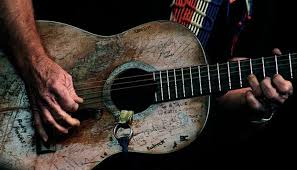Have you ever thought, “I’m too old to learn guitar. If only I had started as a kid, I’d already be the guitarist I dream of being.”? This is a common thought for people in their 40s, 50s, 60s, and beyond. Many believe that unless you start young, it’s impossible to become a skilled guitarist.

Here’s the truth: It’s never too late.
Starting as a Child: The Real Picture
It’s easy to assume kids have an unbeatable advantage when learning guitar. But the reality is far more balanced.
Advantages of Kids
- Aural Skills: Kids often excel in hearing and replicating sounds, which can give them an edge in ear training.
- No Preconceptions: Children approach learning without self-doubt or limiting beliefs, which can help them stay in the moment and enjoy the process.
- Nimble Fingers: Younger learners may find it easier to develop finger dexterity.
Challenges for Kids
- Shorter Attention Spans: Staying focused on practice can be a challenge for kids, making consistent progress slower.
- Physical Limitations: Lack of strength and smaller hands can make certain techniques and chords more difficult.
- Processing Skills: Kids’ cognitive abilities are still developing, which can make understanding complex concepts slower than for adults.
Starting as an Adult: Your Hidden Advantages
If you’re an adult thinking about learning guitar, don’t underestimate your strengths. You bring unique advantages to the table that can help you excel.
Advantages of Adults
- Physical Strength: Fully developed hands make handling a full-size guitar and forming chords easier.
- Cognitive Processing: Your ability to understand and process information is far superior to that of a child, which helps when learning scales, music theory, and techniques.
- Focus: Adults are often more disciplined and focused, which leads to more effective practice sessions.
Challenges for Adults
- Aural Skills: You might find it harder to develop a sharp ear for music, but this can improve with practice.
- Mindset Barriers: Many adults struggle with limiting beliefs about their potential, which can hold them back more than any physical limitation.
- Flexibility: Your fingers and hands may not be as flexible as they once were, but regular practice will improve this over time.
Why Age Is Irrelevant
At the end of the day, learning guitar is less about your age and more about your commitment. Whether you’re 15 or 50, success comes down to consistency, focus, and a positive mindset.
Here’s what you need to know:
- Mindset Matters Most: Believe you can do it. Your mindset shapes your actions, and with the right attitude, you’ll make progress.
- Challenges Are Temporary: Every guitarist faces obstacles, regardless of age. With patience and persistence, you’ll overcome them.
- It’s About the Journey: Guitar is a skill you can enjoy for a lifetime. The joy isn’t just in reaching your goal but in the process of learning and growing along the way.
Take the Leap
So, are you too old to play guitar? Absolutely not. The only thing standing between you and your dream of playing is the decision to start.
Every great guitarist was once a beginner. Age didn’t hold them back, and it shouldn’t hold you back either. Make the decision today—you’ve got this!
About the author:
Jake Willmot likes to practice guitar every day for at least 1 hour a day, as he is really enthusiastic when it comes to playing guitar. Jake has always preferred playing the guitar over a lot of things, even when he was at school and his friends were all playing football rugby, he always preferred the guitar. This has carried on to this day as he gives guitar lessons in Exmouth, Devon.

